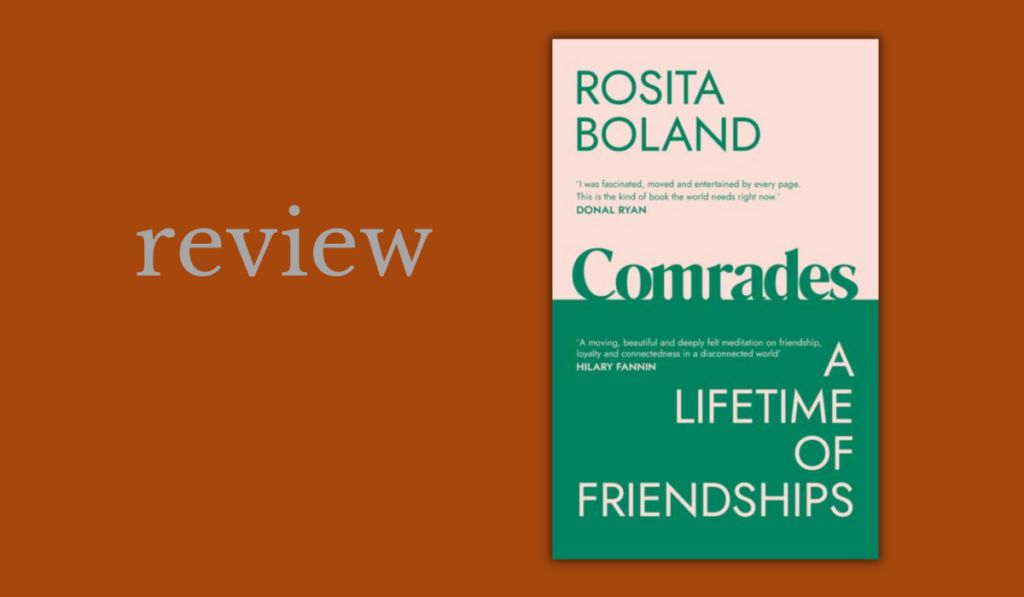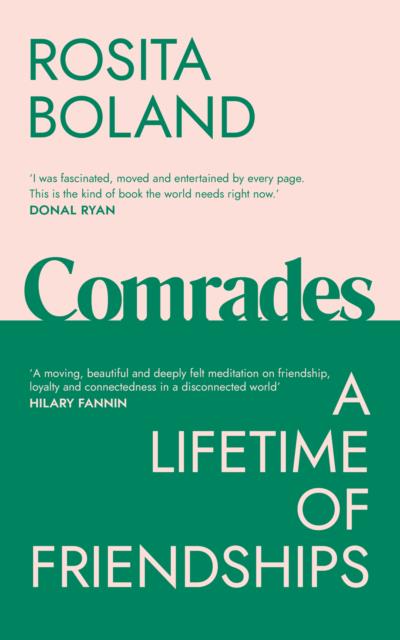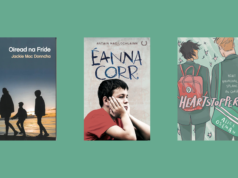
Comrades|Rosita Boland|Doubleday|ISBN:9781781620540|€16.99
Laura King on the power of companionship and imagination in Comrades, by Rosita Boland
by Laura King
Comrades by Rosita Boland is a warm, wistful celebration of friendship and a remedy for loneliness, both for the reader and, it seems, the author.
Written in isolation from her friends in 2020, this collection of essays is about Boland’s lifelong friendships and passions, a memoir that reaches out into the darkness of lockdown to try to touch the lives and experiences of future readers.
The subjects of the essays range in theme from actual friendships (the unrequited love for a friend from college, friends she made while travelling, neighbours, friends of friends) to the passions she shares with her friends, imaginary friends, and meaningful relationships she has had with novels over her lifetime.
Openhearted
Boland’s writing is characteristically thoughtful and earnest, with lines and passages every now and then that stop you in your tracks.
Her style of personal writing is not only openhearted but quite literary in style, which is a pleasure to read.
Naturally, some essays are stronger than others – for instance, an essay about friendships that have ended is too vague and passive to be that compelling, though it’s not surprising that Boland can’t delve too deeply into wrongdoing when writing about real people.
Additionally, the essay about people she has interviewed could either have been shorter or the subject of a whole, different book. However, the pieces about imagination and reading are really special and the author’s love and enthusiasm shines through the page.
Imaginary friends
‘Imaginary Friends’ is not only arguably the strongest essay in Comrades, but the piece gets to the heart of the work most directly. In this first essay, Boland invites us into a lonely childhood saved by imagination and curiosity, where reading was her main entry point to the rest of the world.
Her discovery of the Puffin Club and subsequent disappointment when she realises she can’t meet up with other members at gatherings in the UK is heart-breaking.
The detail of her scheming and bartering for an English stamp so she can send away for a membership packet seems so small and inconsequential, which reminds us of how powerless and often how isolated children are.
After we share this vulnerable memory with the author, it is a welcome and moving ending that as an adult Boland befriends the editor and the other members she longed to meet, and in some respects this puts right a wrong from her childhood.
Boland is perhaps so exuberant in her love for her friends because she spent so long without one, and instead of the book merely being a celebration of friendship is it more interesting to think of it as resistance to or fight against loneliness.

Loneliness
Loneliness is an absence or opposite to the wonder of friendship, which is what really defines the book. Perhaps isolation through various lockdowns inspired this collection, but it must also inspire within its readers a newfound appreciation for companionship.
There is a lovely gratefulness for connection with other people throughout that I don’t think might ring as true with readers had they not just gone through something similar themselves.
I loved Elsewhere, Boland’s memoir of her life in travel, but it is quite a different book to Comrades. In Elsewhere, the essays range a lot more in tone, and are all so particular to a time and place. The ache I felt while reading the whole book became so acute I could barely stand it.
Refuge and respite
In contrast, though my heart was warmed by Boland’s childhood affinity with The Puffin Club, and I genuinely felt nervous during the events of ‘Essential Friend’ and ‘Disappeared Friend’, they didn’t have quite the same emotional impact. However, I think this could be a somewhat unfair comparison, because it is hard to talk about something as universal yet as unique as friendship.
What pushes this book and makes it better than just a safe, “nice” topic, is the feeling of a refuge or respite from our natural condition of being alone, due to Boland’s gift for forging an emotional bond with her readers.
We can be in such a rush to race through each book, to get to the heart of it and then move on to the next that we don’t take time to reflect on the piece of writing itself and our relationship to it. Comrades should be taken down off one’s shelf for comfort or guidance, when you need a lift, or a reminder of the power of companionship, imagination and reading.

Laura King works in publishing in Dublin, and in her spare time reviews books online under the name @lauraeatsbooks











